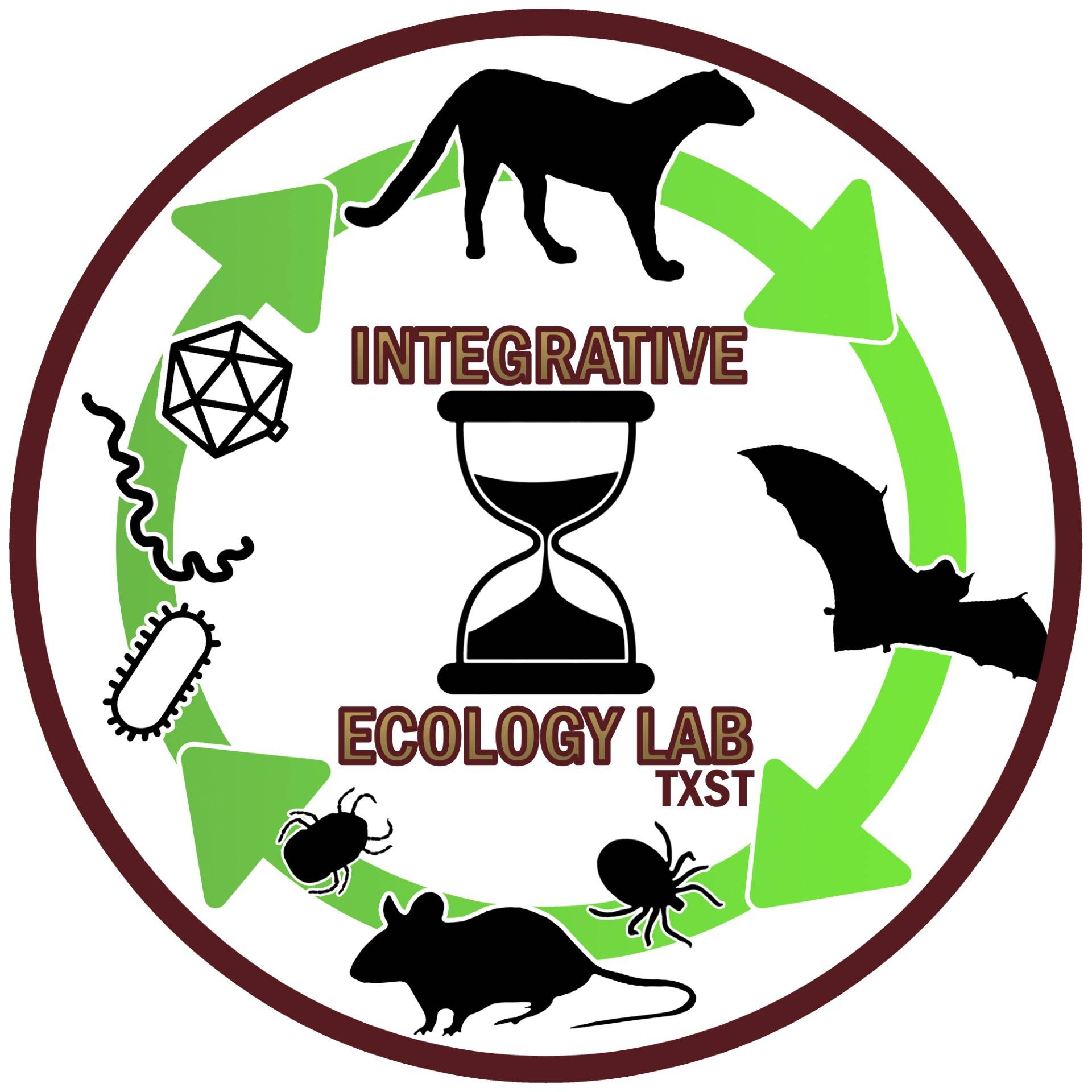
|
Dr. Ivan Castro-Arellano, Lead PI E-mail: ic13@txstate.edu
Mailing Address
|
Research Interests
Disease ecology
- Ecology of zoonotic pathogens
- Hantavirus ecology
- Tick-borne pathogens
Community ecology
- Ecology and evolution of diel activity patterns
- Null model use for community ecology analyses
- Metacommunity theory
Mammal ecology and conservation
- Mammal invasive species
- Small mammal conservation
I use my background and training as an ecologist to address questions to understand the ecology of zoonotic diseases and invasive species. Since mammals are natural reservoirs for many zoonotic diseases most of my work has been devoted to this taxonomic group, especially rodents and bats. Moreover, I also have done work related to conservation of mammal species and I am currently a member of the International Union for the Conservation of Nature (IUCN) Small Mammal Specialist Group (https://small-mammals.org/members/).
Beyond my interest in disease ecology I also have done research on theoretical aspects of community ecology, specifically on the analysis of assemblage-wide temporal niche overlap and elements of metacommunity structure. I address these questions using a variety of approaches that include modelling, null models, and analyses of both published and empirically data generated at my lab. Although my research interests are wide, they are intertwined, and my goal is to integrate these seemingly separate areas. For example, one main goal for the study of community level patterns and dynamics of mammalian hosts is to understand the process of pathogen transmission. Similarly, in my lab we also have done work on the role of invasive species for pathogen spread. Currently my lab is also exploring the potential role of temporal niche conservatism as a source of information to guide management and conservation decisions in mammal species.
Courses
Techniques in Wildlife Management (BIO4435/5435)
Wildlife Management (BIO4423/5423)
Biological Resources: Conservation and Planning (BIO4319)
Problems in Biological Sciences (BIO5390)
Internship in Biological Laboratory Techniques (BIO4481)
Ecology of Infectious Diseases in Wildlife (BIO7414)
Population and Conservation Biology Seminar (BIO7120)
Wildlife and Recreation: Impact, Management, and Policy (BIO4304/5304)
Conservation of Large Mammals (BIO4351H/5324)
The last two courses in this list are restricted to summer sessions, and they form part of my Study In America Program (https://www.extension.txst.edu/sia/study-in-america-offerings/biology-in-national-parks-22.html ) that includes a 2-week field trip to the Greater Yellowstone Ecosystem. For future years this program will run in alternate years to visit National Parks in Alaska (i.e., Denali, Kenai Fjords).
Recent Publications
For a list of recent publications and access to the pdf’s of these papers you can access my Research Gate profile (http://www.researchgate.net/profile/Ivan_Castro-Arellano) or my Google Scholar profile (https://scholar.google.com/citations?user=MUg_dO4AAAAJ&hl=en).
Major Grants
2024-2025 ($106,805) Co-PI. Texas Department of Transportation. Ascertaining best management practices for the roadside habitat of Texas kangaroo rats.
2021-2022 ($50,655) Co-PI. United States Fish and Wildlife Services Endangered Species Candidate Conservation Funds. Estimating density and size of roadside populations of the Texas Kangaroo Rat.
2016-2018 ($107,501) PI. Texas Parks and Wildlife State Wildlife Grants. Studying Behavior and Testing Strategies to Reduce Impact of Wind Energy on Bats in Texas.
2015-2016 ($69,717) Co-PI. Texas Parks and Wildlife State Wildlife Grants. Distribution of the Texas Kangaroo Rat (Dipodomys elator) in Texas
2015-2017 ($386,463) Co-PI. NIH R21 (PA13-303). Population genetic structure of Ixodes scapularis and disease transmission. $138,230 subaward to Texas State University.
2014-2016 ($1,000,000). Research project for Integrated Control of the Southern Cattle Fever tick in Puerto Rico. Puerto Rico Department of Agriculture. $101,793 for Castro-Arellano as PI for sub award project: Possible role of invasive Herpestes javanicus in sustaining cattle fever tick populations in Puerto Rico.
2012-2014 ($390,014) Research Supervisor (PI). Texas Department of Transportation. Contribution of Bridge Dwelling Birds to Bacterial Quality Impairments
2012-2015 ($130,000 approx). Co-PI with Gerardo Suzan (PI). Consejo Nacional de Ciencia y Tecnologia (Mexico). Proyecto de ciencia básica #179482. Effect of diversity on the prevalence of zoonotic agents in wild rodents in northeastern Chihuahua.
2010-2012. ($24,000) PI. Texas A&M-CONACyT Collaborative Research Grant Program. Prevalence and characterization of Hantaviruses and Arenaviruses in wild and peridomestic settings of northeastern Mexico.